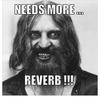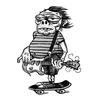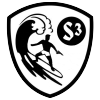AlligatorShoes

Joined: Jul 02, 2018
Posts: 1
|

Posted on Sep 29 2021 02:58 AM
I'm currently on a deep dive into surf music and have noticed that a lot of bands pair sci fi visual aesthetics with their surf music. I'm not sure if Man or AstroMan was one of the first or if they are just at the forefront of it. The Astronauts had a surf related name, but none of the imagery.
Does anyone know how or why these two styles became connected? If anyone has a recommendation of books or documentaries that cover surf music I'd be really interested in those as well.
Any info is appreciated!
|
bigtikidude

Joined: Feb 27, 2006
Posts: 25309
Anaheim(So.Cal.)U.S.A.






|

Posted on Sep 29 2021 07:14 AM
The 60s Spotniks from Sweden.
— Jeff(bigtikidude)
|
TheFintastics

Joined: Jul 28, 2008
Posts: 459
Wichita Falls, Texas





|

Posted on Sep 29 2021 08:04 AM
This isn't "traditional surf" but my favorite Ventures album certainly had a strong space theme which was released shortly after their "Surfing" album.
I think the entire album was/is a masterpiece.
— _
Hi, I'm Gellert, guitarist for The Fintastics.
https://www.facebook.com/TheFintastics
|
DannySnyder

Joined: Mar 02, 2006
Posts: 11010
Berkeley, CA











|

Posted on Sep 29 2021 08:26 AM
There's a couple factors that I can think of. Foremost is that most surf bands lack a front person, and often any sort of a dynamic stage presence. Add to that by the 90's it became band protocol to develop an image in which to promote yourselves. Surf music is forever tied to the atomic age and there is a natural tendency to use imagery that reflects that time.
Full disclosure, I'm as guilty as any of those bands, The TomorrowMen were Time Travel themed.
— Danny Snyder
Latest project - Now That's What I Call SURF
_
"With great reverb comes great responsibility" - Uncle Leo
I'm back playing keys and guitar with Combo Tezeta
Last edited: Sep 29, 2021 08:28:34
|
ElectricLimnology

Joined: Nov 20, 2017
Posts: 104
Southeast MIchigan


|

Posted on Sep 29 2021 09:36 AM
The connection between surf music and sci-fi themes has to do with the era from which it came. Surf music peaked in popularity in 1961. In May of that year JFK addressed Congress committing the country to putting a man on the moon by decades end. A few years earlier in 1957 the Soviet Union dazzled the world and officially kicking off the space race with the successful deployment of Sputnik 1. Futuristic themes of space travel were part of the zeitgeist. “Space Age” was everywhere in marketing and popular culture. Kids playing electric music particularly featuring the deep way-out sounds of heavy reverb made that aesthetic connection. Bands like Man Or Astroman who picked up with those themes decades later in the 90s were paying homage to and expanding on the aesthetics of the era. Looking back it seems like retro stuff was nearly as popular in the 90s as the original space age stuff was in 1961. Surf music was as space age as any other contemporarily styled thing from the period.
— The Vicissitones
Diesel Marine
The Rasputones
Last edited: Sep 29, 2021 12:26:13
|
surferjoemusic

Joined: Jan 01, 2008
Posts: 2105
Livorno





|

Posted on Sep 29 2021 10:49 AM
ElectricLimnology wrote:
The connection between surf music and sci-fi themes has to do with the era from which it came. Surf music peaked in popularity in 1961. In May of that year JFK addressed Congress committing the country to putting a man on the moon by decades end. A few years earlier in 1957 the Soviet Union dazzled the world and officially kicking off the space race with the successful deployment of Sputnik 1. Futuristic themes of space travel were in the zeitgeist. “Space Age” was everywhere in marketing and popular culture. Kids playing electric music particularly featuring the deep way-out sounds of heavy reverb made that aesthetic connection. Bands like Man Or Astroman who picked up with those themes decades later in the 90s were paying homage to and expanding on the aesthetics of the era. Looking back it seems like retro stuff was nearly as popular in the 90s as the original space age stuff was in 1961. Surf music was as space age as any other contemporarily styled thing from the period.
So you are convinced that the kids on the beach of San Clemente, doing nothing but surfing all day, chasing the girls and talking tribal language between them, going to dance at the Rendezvous on Saturday night while getting tremendously drunk with cheap beer, really cared of what JFK said, Sputnik, Soviet Union and space age? Therefore there is a link between surf music, Leo Fender, loud volumes and science fiction?
— Lorenzo "Surfer Joe" Valdambrini
(www.surfmusic.net)
|
surferjoemusic

Joined: Jan 01, 2008
Posts: 2105
Livorno





|

Posted on Sep 29 2021 10:52 AM
AlligatorShoes wrote:
I'm currently on a deep dive into surf music and have noticed that a lot of bands pair sci fi visual aesthetics with their surf music. I'm not sure if Man or AstroMan was one of the first or if they are just at the forefront of it. The Astronauts had a surf related name, but none of the imagery.
Does anyone know how or why these two styles became connected? If anyone has a recommendation of books or documentaries that cover surf music I'd be really interested in those as well.
Any info is appreciated!
Are they connected? Damn, I did not get the memo...
— Lorenzo "Surfer Joe" Valdambrini
(www.surfmusic.net)
|
spskins

Joined: Feb 27, 2006
Posts: 3732
tn







|

Posted on Sep 29 2021 12:08 PM
While there was Sputnik and the space race beginning, you have to add the element of drive-in and Saturday matinee movies beginning to appear on television in the late 50s. Kids and teenagers were not just watching, but becoming obsessed with them. Along with the Universal monsters enjoying a huge resurgence, the flying saucer movies were also being beamed into every television in America. The idea of flying saucers and martians took over (see "My Favorite Martian", the show and the song "Our Favorite Martian" by the BF4) along with monsters and surf and the beach craze. The reverb effect and rolling drums not only reminded listeners of surfing and the sea, but as a sound effect, reverb and tremolo could be used to make "space" and "spooky" sounds.
Sure, in 62, Dick Dale, Dave Meyers and the like were playing to real surfers, but it didn't take long for the kahunas to reject surf music once it got huge in 63/64 as it became "kid stuff"...and it was, adolescent teens all over the country were listening to it as they built their monster, hot and rocket models and dreamed of going surfing one day.
— http://www.satanspilgrims.com
http://www.facebook.com/pages/Satans-Pilgrims/8210228553
https://satanspilgrims.bandcamp.com/
http://www.surfyindustries.com
Last edited: Sep 29, 2021 12:11:15
|
ElectricLimnology

Joined: Nov 20, 2017
Posts: 104
Southeast MIchigan


|

Posted on Sep 29 2021 12:25 PM
surferjoemusic wrote:
ElectricLimnology wrote:
The connection between surf music and sci-fi themes has to do with the era from which it came. Surf music peaked in popularity in 1961. In May of that year JFK addressed Congress committing the country to putting a man on the moon by decades end. A few years earlier in 1957 the Soviet Union dazzled the world and officially kicking off the space race with the successful deployment of Sputnik 1. Futuristic themes of space travel were in the zeitgeist. “Space Age” was everywhere in marketing and popular culture. Kids playing electric music particularly featuring the deep way-out sounds of heavy reverb made that aesthetic connection. Bands like Man Or Astroman who picked up with those themes decades later in the 90s were paying homage to and expanding on the aesthetics of the era. Looking back it seems like retro stuff was nearly as popular in the 90s as the original space age stuff was in 1961. Surf music was as space age as any other contemporarily styled thing from the period.
So you are convinced that the kids on the beach of San Clemente, doing nothing but surfing all day, chasing the girls and talking tribal language between them, going to dance at the Rendezvous on Saturday night while getting tremendously drunk with cheap beer, really cared of what JFK said, Sputnik, Soviet Union and space age? Therefore there is a link between surf music, Leo Fender, loud volumes and science fiction?
I said it was part of the zeitgeist. That whole soup of beach culture and whatever else was going on swirled together and some, not all, of the music came out with space themes attached. I don’t want to split hairs over what is or isn’t actual “surf music” vs other very similar contemporaneous forms of reverby instrumental guitar music but songs with titles like “Telstar” (a group of communication satellites launched into orbit in 1962 I believe) or “Our Favorite Martian”, “Failsafe” “Countdown” to name a few are clearly taking inspiration from space stuff. Take the The Fireballs for instance, the name is a reference to meteorites. I’m not saying surf music was inspired by the space program or anything. That would be silly. I’m merely positing why it is likely that a few groups incorporated futuristic space age themes into their song titles, band names or graphic content. It is one tiny facet of the music. The space age touched many aspects of American culture, reverby instrumental music included.
— The Vicissitones
Diesel Marine
The Rasputones
|
ElectricLimnology

Joined: Nov 20, 2017
Posts: 104
Southeast MIchigan


|

Posted on Sep 29 2021 12:27 PM
spskins wrote:
While there was Sputnik and the space race beginning, you have to add the element of drive-in and Saturday matinee movies beginning to appear on television in the late 50s. Kids and teenagers were not just watching, but becoming obsessed with them. Along with the Universal monsters enjoying a huge resurgence, the flying saucer movies were also being beamed into every television in America. The idea of flying saucers and martians took over (see "My Favorite Martian", the show and the song "Our Favorite Martian" by the BF4) along with monsters and surf and the beach craze. The reverb effect and rolling drums not only reminded listeners of surfing and the sea, but as a sound effect, reverb and tremolo could be used to make "space" and "spooky" sounds.
Sure, in 62, Dick Dale, Dave Meyers and the like were playing to real surfers, but it didn't take long for the kahunas to reject surf music once it got huge in 63/64 as it became "kid stuff"...and it was, adolescent teens all over the country were listening to it as they built their monster, hot and rocket models and dreamed of going surfing one day.
You beat me to it, but yes this.
— The Vicissitones
Diesel Marine
The Rasputones
|
surferjoemusic

Joined: Jan 01, 2008
Posts: 2105
Livorno





|

Posted on Sep 29 2021 03:06 PM
ElectricLimnology wrote:
surferjoemusic wrote:
ElectricLimnology wrote:
The connection between surf music and sci-fi themes has to do with the era from which it came. Surf music peaked in popularity in 1961. In May of that year JFK addressed Congress committing the country to putting a man on the moon by decades end. A few years earlier in 1957 the Soviet Union dazzled the world and officially kicking off the space race with the successful deployment of Sputnik 1. Futuristic themes of space travel were in the zeitgeist. “Space Age” was everywhere in marketing and popular culture. Kids playing electric music particularly featuring the deep way-out sounds of heavy reverb made that aesthetic connection. Bands like Man Or Astroman who picked up with those themes decades later in the 90s were paying homage to and expanding on the aesthetics of the era. Looking back it seems like retro stuff was nearly as popular in the 90s as the original space age stuff was in 1961. Surf music was as space age as any other contemporarily styled thing from the period.
So you are convinced that the kids on the beach of San Clemente, doing nothing but surfing all day, chasing the girls and talking tribal language between them, going to dance at the Rendezvous on Saturday night while getting tremendously drunk with cheap beer, really cared of what JFK said, Sputnik, Soviet Union and space age? Therefore there is a link between surf music, Leo Fender, loud volumes and science fiction?
I said it was part of the zeitgeist. That whole soup of beach culture and whatever else was going on swirled together and some, not all, of the music came out with space themes attached. I don’t want to split hairs over what is or isn’t actual “surf music” vs other very similar contemporaneous forms of reverby instrumental guitar music but songs with titles like “Telstar” (a group of communication satellites launched into orbit in 1962 I believe) or “Our Favorite Martian”, “Failsafe” “Countdown” to name a few are clearly taking inspiration from space stuff. Take the The Fireballs for instance, the name is a reference to meteorites. I’m not saying surf music was inspired by the space program or anything. That would be silly. I’m merely positing why it is likely that a few groups incorporated futuristic space age themes into their song titles, band names or graphic content. It is one tiny facet of the music. The space age touched many aspects of American culture, reverby instrumental music included.
Oh no, not even I am talking about saying what is or isn't surf at all, I am just not convinced that surf music had any influence from sci-fi or what you say. The fact that those themes could have got into surf music later on does not mean they inspired it in its beginning.
— Lorenzo "Surfer Joe" Valdambrini
(www.surfmusic.net)
|
SilverFlash

Joined: Jul 14, 2015
Posts: 472
Near Atlanta, GA




|

Posted on Sep 29 2021 04:34 PM
Hi ElectricLimnology, I think your ask a very interesting question and I agree with you, there is a connection between surf music and sci-fi, b-movies and a host of pop culture influences. When I wrote my Classic Instrumental Surf Music Timeline, I included Popular culture references for events that may have influenced the development of surf music. As you said, the connection may not be direct, but the swirl of events coinciding with the baby-boomers hitting their teenage years cannot be ignored.
Ted (spskins) - great write up! You stated it beautifully.
surferjoemusic wrote:
... I am just not convinced that surf music had any influence from sci->fi or what you say. The fact that those themes could have got into surf >music later on does not mean they inspired it in its beginning.
Hmmm... In the beginning, I'm sure 'Mr. Moto' was an old B-movie series starring Peter Lorre. So did it inspire Paul Johnson to write one of the first surf tunes? Not directly, but hey, it must have been somewhere in his mind to give the tune that name.
Here are a few events focusing on technology, Science Fiction, Horror, and genre movies that I included in my timeline. All are labeled with the [POP] tag:
[POP] First commercially produced transistor radio The Regency TR-1 was announced on October 18, 1954 by the Regency Division of I.D.E.A., was put on sale in November 1954, and was the first practical transistor radio made in any significant numbers.
[POP] The Space Race – 8/55 [The Space Race began on August 2, 1955, when the Soviet Union responded to the US announcement four days earlier of intent to launch artificial satellites for the International Geophysical Year, by declaring they would also launch a satellite "in the near future". The Soviet Union beat the US to the first successful launch, with the October 4, 1957, orbiting of Sputnik 1, and later beat the US to have the first human in earth orbit, Yuri Gagarin, on April 12, 1961. ]
[POP] Shock Theater - 10/57 Shock Theater (marketed as Shock!) was a package of 52 pre-1948 classic horror films from Universal Studios released for television syndicationin October 1957 by Screen Gems, the television subsidiary of Columbia Pictures. The Shock Theater package included Dracula, Frankenstein, The Mummy, The Invisible Man and The Wolf Man as well as a few non-horror spy and mystery films. A second package, Son of Shock, was released for television by Screen Gems in 1958, with 20 horror films from both Universal and Columbia.]
[POP] Famous Monsters of Filmland – Issue #1 Published 2/58
[POP] Movie “Gidget” Gidget is a 1959 Columbia Pictures CinemaScope feature film. It stars Sandra Dee, Cliff Robertson, and James Darren in a story about a teenager's initiation into the California surf culture and her romance with a young surfer. The film, which received one award nomination, not only inspired various sequel films, a television series, and television films, but is also considered the beginning of the entire "beach party film" genre. Gidget is credited by numerous sources (Stoked! A History of Surf Culture by Drew Kampion; The Encyclopedia of Surfing by Matt Warshaw; and Riding Giants a documentary film by Stacy Peralta – to name just three) as the single biggest factor in the mainstreaming of surfing culture in the United States.
[POP] The Twilight Zone First episode aired 10/59
[POP] Telstar 1 - satellite Launch 7/62
Telstar 1 launched on top of a Thor-Delta rocket on July 10, 1962. It successfully relayed through space the first television pictures, telephone calls, and telegraph images, and provided the first live transatlantic television feed.
[POP] James Bond Movie "Dr. No" Released 10/62 This movie kicked of the ‘60s Spy-craze and introduced the “James Bond theme 10/62 [Proto-Surf]” instrumental. The "James Bond Theme" is the main signature theme of the James Bond films and has featured in every Eon Productions Bond film since Dr. No, released in 1962. The piece has been used as an accompanying fanfare to the gun barrel sequence in almost every James Bond film. The electric guitar riff heard in the original recording of the theme was played by Vic Flick.
[POP] The Outer Limits First episode aired 9/63
[POP] Movie "Beach Party" 8/63 Gary Usher and Roger Christian wrote three songs that appear in the film: the title track, performed by Avalon and Funicello; and "Swingin' and a-Surfin'" and "Secret Surfing Spot", both performed by Dick Dale and the Del Tones.
[POP] The Addams Family (first aired September 18, 1964) and The Munsters (aired September 24, 1964) It must have been a great week for fans of the macabre back in 1964. On Friday September 18, the first episode of the Addams Family was broadcast. Six days later, The Munsters came out of their coffins. It was also the week Bewitched was launched.
[POP] Album – Dracula’s Deuce – The Ghouls, ?/64 This was a novelty Halloween album produced, arranged, and conducted by Gary Usher, that is a mash up of seemingly every fad going in 1964: Surf, Hot Rod, and Monsters. It parodies several hits (“Little Old Lady From Transylvania”, “Be True To Your Ghoul”, and “Shake, Rattle And Rot”), but manages to have some effective instrumental surf written and performed by Richard Podolor (“Dracula’s Theme”, “Voo Doo Juice”, and “Coffin Nails”). Drums are courtesy of Hal Blaine, who drummed on a monstrous number of surf tracks for countless studio bands.
“The Good, The Bad and the Ugly” – Hugo Montenegro [Proto-Surf, BillboardYE100/8] Embraced by surf musicians, the Spaghetti Western lives on as a sub-genre of instrumental surf rock. "While surf music gives you the feeling of riding the waves, spaghetti western music conjures images of riding tall in the saddle," says Ted James, owner of Deep Eddy Records in Austin, Texas, a label that specializes in surf, instrumental rock and garage.]
While not included in my timeline, I want to share this Frank Frazetta ad from Warren Publishing's Creepy magazine circa 1964. They must have figured surfers (or at least hodads) were reading monster books.

— -Tim
MyYouTubeChannel
My Classic Instrumental Surf Music Timeline
SSS Agent #777
|
ArtS

Joined: May 09, 2008
Posts: 1251
Isle of Kent, MD







|

Posted on Sep 30 2021 07:44 AM
Nice post Silverflash. I've got 5 minutes so I'll add my 2 cents.
Surf music may have its very early origins in California but the music was heavily influenced by non surfers landlocked in the Midwest and east coast. So saying they were the main influence is a bit short sighted.. Early surf movies used to play a kind of jazz/big band soundtrack. Surf, spy and beach all grew up together and borrowed from each other. Reverb laden guitars, lack of vocals and the eventual avante garde pigeon hole classifying of the music lent itself easily to low budget and atmospheric movies. I was born in the early 60s, my recollection is surf, Gemini, wolfman, Kennedy,, King,, Kennedy,, Beatles, moon, then the 70s. I checked out a lot musically until 78. (not necessarily in that order)
Anyway, for me since birth, surf, space, spy, monster was the cool tv, movie & sound and not top 40.
Okay on to work. My surf music brothers and sisters from California may have a completely different take, and my memory fades with each passing year...
— Surfcat
2023 SG101 Compilation - Tribute to Noel
The Journey Home - Agent Octopus (Our SG101 Comp download)
From Atlantis with Love - Released - July 2023
Agent Octopus-Spotify
Christmas on the Beach - NEW SINGLE Dec 2023!!
Reverb Galaxy - Angle of Attack CD - BANDCAMP
Surf, the most dangerous of all musical genres...
Last edited: Sep 30, 2021 12:11:12
|
ArabSpringReverb

Joined: Jul 13, 2012
Posts: 490
San Diego CA



|

Posted on Sep 30 2021 10:20 AM
excellent topic and responses . Lorenzo maybe got hung up on the origins of surf being related to the space age but he's missing the forest for the trees as they say . Kids and teens didnt all live near the water and every song needs a title so the omnipresent space race got a lot of attention . This thread could easily be about monster influence in surf and the answers would be the same . Kids grew up watching westerns , monsters and outer space movies in theaters and on tv so its only natural that song titles represent their influences . Todays space themed bands just reflect that original influence ...and its fun .
|
Redfeather

Joined: Jul 30, 2016
Posts: 854

|

Posted on Sep 30 2021 01:56 PM
In support of the point ElectricLimnology made regarding the zeitgeist of the early 60's and its influence on music, the memo of which surferjoemusic missed, here are some songs.
It's notable that one of the biggest hits in surf music, Pipeline, was named that only after the surfing craze fired off and was originally called "44 Magnum" and then "Liberty's Whip" after the band saw "The Man Who Shot Liberty Valance."
Westerns and space were obviously huge with young teenagers in the USA at that time. I doubt many of the 13-17 year olds recording the bulk of surf music were out surfing and getting drunk on cheap beer. They were getting driven to the recording studios by their parents...
|
rfcii

Joined: Oct 28, 2018
Posts: 150
Quimper Peninsula, WA



|

Posted on Sep 30 2021 04:44 PM
Is it possible that the same kids who were close enough to the beach to go surfing, AND had families that could afford new Fender guitars, had parents employed in the SoCal aerospace industry and assorted constellations of contractors? Seems like these same kids might have parents into model aviation, rocketry, early computers, hi-fi, oscilloscopes, etc.
Just a speculation, but seems pretty reasonable.
Last edited: Sep 30, 2021 16:45:15
|
bigtikidude

Joined: Feb 27, 2006
Posts: 25309
Anaheim(So.Cal.)U.S.A.






|

Posted on Sep 30 2021 09:20 PM
Sounds very possible to me.
— Jeff(bigtikidude)
|
synchro

Joined: Feb 02, 2008
Posts: 4127
Not One-Sawn, but Two-Sawn . . . AZ.





|

Posted on Oct 02 2021 02:20 AM
ElectricLimnology wrote:
surferjoemusic wrote:
ElectricLimnology wrote:
The connection between surf music and sci-fi themes has to do with the era from which it came. Surf music peaked in popularity in 1961. In May of that year JFK addressed Congress committing the country to putting a man on the moon by decades end. A few years earlier in 1957 the Soviet Union dazzled the world and officially kicking off the space race with the successful deployment of Sputnik 1. Futuristic themes of space travel were in the zeitgeist. “Space Age” was everywhere in marketing and popular culture. Kids playing electric music particularly featuring the deep way-out sounds of heavy reverb made that aesthetic connection. Bands like Man Or Astroman who picked up with those themes decades later in the 90s were paying homage to and expanding on the aesthetics of the era. Looking back it seems like retro stuff was nearly as popular in the 90s as the original space age stuff was in 1961. Surf music was as space age as any other contemporarily styled thing from the period.
So you are convinced that the kids on the beach of San Clemente, doing nothing but surfing all day, chasing the girls and talking tribal language between them, going to dance at the Rendezvous on Saturday night while getting tremendously drunk with cheap beer, really cared of what JFK said, Sputnik, Soviet Union and space age? Therefore there is a link between surf music, Leo Fender, loud volumes and science fiction?
I said it was part of the zeitgeist. That whole soup of beach culture and whatever else was going on swirled together and some, not all, of the music came out with space themes attached. I don’t want to split hairs over what is or isn’t actual “surf music” vs other very similar contemporaneous forms of reverby instrumental guitar music but songs with titles like “Telstar” (a group of communication satellites launched into orbit in 1962 I believe) or “Our Favorite Martian”, “Failsafe” “Countdown” to name a few are clearly taking inspiration from space stuff. Take the The Fireballs for instance, the name is a reference to meteorites. I’m not saying surf music was inspired by the space program or anything. That would be silly. I’m merely positing why it is likely that a few groups incorporated futuristic space age themes into their song titles, band names or graphic content. It is one tiny facet of the music. The space age touched many aspects of American culture, reverby instrumental music included.
Popular music is a product of zeitgeist. I WW II, they sang about The same was true of the Civil War and the Revolutionary War. Stephen Foster wrote about life during the relatively peaceful period before the Civil War. Ever since music became a product, whether as sheet music, piano roles, wax cylinders, or all the technologies since, successful composers and musicians have to sell whatever the public is buying, so it makes a lot of sense to tap into whatever interests the masses at a given time.
One other thing I’ll mention, as groundwork to what follows, is that while we tend to think in terms of decades, social trends don’t necessarily wait for a year divisible by 10 before they change. What is more, change is not always sudden, it takes time for old trends to taper off, while new trends ascend over time. From firsthand experience, I can state the the early sixties had an entirely different zeitgeist than the late sixties. Frankly, I see 1962 as having much more in common with the late fifties than the late sixties.
My personal opinion is that Surf, as we know and love it from the first wave, owes a great debt to Duane Eddy (who probably was inspired by Bill Justus’ “Raunchy”) and some of the other instrumental music that came along in the late ‘50s and early ‘60s. The dependencies for what was happening circa 1961-1963 go back years. Leo Fender’s twangy Telecaster, various forms of echo and reverb effects, culminating in the 6G15, and the development of amps, all played a role. It these sounds were being heard in other genres, as well. Country pursued twangy sounds and, Spy movies, and the ubiquitous Westerns of the day, also employed a similar sound.
From what I have read, and from my own memories of the era, Surf Music was sort of a perfect storm. There were the twangy sounds of Duane Eddy and his peers, increasing availability of reverb I. Smaller studios and eventually for live performances, developments in guitars and amps (such as the Jazzmaster and the Brownface amps), which all congealed about the time that the youth surfing culture on SoCal began to attract some attention.
But that was also the post IGY era, the beginning of the Space Race, and Ian Fleming’s spy fantasies, built a upon his WW II experiences, were beginning to gain traction, so when the Bond movies hit the theaters, in 1962, they used a variation of the twangy guitar sound. And there was a lot of music that was similar to Surf being created, and not all of it was aimed at the youth market.
While the Rendezvous Ballroom and Huntington Beach were important to the music coming directly out of the SoCal Surf culture, there was a lot of similar music being created which claimed no connection to surfing. Frankly, circa 1961, I would venture that the public at large was more interested in Outer Space than in surfing. So, while the SoCal scene was essential to Surf music, young people across the country were living their lives, which for most of us did not include surfing. Living in lake country at the time, I know that there were a lot of beach parties in places that had no surf to ride.
So, if there are fine lines to be drawn, wher do we draw these lines? Is Surf Music only from the beaches of SoCal? Does Inland Empire music count, even though the beach was probably an hour’s drive away? How about land-locked bands like the Astronauts or the Trashmen? I’ve lived near Boulder for much of my adult life and also in metro Minneapolis and can say without fear of equivocation that there are no waves on Boulder Reservoir and Lake Minnetonka, as lovely as it is, has little to offer to persons wishing to surf.
IMHO, Alligator Shoes asked a great question. SilverFlash’s earlier thread (https://surfguitar101.com/forums/topic/31843/?page=1#p426008) provides a lot of great information, and I see it as a very honest approach.
while we study the finer points of reverb pans answer various Fender amp circuits, most people define music quite differently than we do, here at this forum. If you flagged down the average teen in 1962 and asked them to name a Surf band, most of them would have answered The Beach Boys or Jan & Dean. We loved Surf instrumentals, but I don’t think that any great mental distinction was made between instrumentals and vocals, by the average listener at the time. Frankly, it was little different from the Easy Listening our parents listened to. They listened to vocal and instrumental tracks of their music and never made a huge distinction between them. I liked the instrumentals, because I loved the sound of guitars, but I was just as entranced by The Beach Boys or Jan & Dean.
While The Beatles may have played a role in the decline of Surf music, I really think that changing social conditions are what finished it off. With the build-up in Vietnam, the average guy at the beach was probably dealing with the prospect of being drafted and sent to ‘Nam, by 1965. Music changed, and it changed rapidly. There was anger and unrest, and the years from 1965 - 1970 spawned much different music than could have been imagined in 1962. When people were scared of dying in a war that they didn’t necessarily support, good times at the beach just didn’t seem quite so important, anymore.
— The artist formerly known as: Synchro
When Surf Guitar is outlawed only outlaws will play Surf Guitar.
|
Fady

Joined: Mar 07, 2010
Posts: 2226
North Carolina









|

Posted on Oct 02 2021 07:54 AM
I have always loved this Fretboard Journal 12 days of Christmas video with Bill Frisell both for the incredible, amazing and beautiful solo arrangement and for his introduction - being teleported instantly by one of those indelible vivid childhood memories with the same innocence, bliss and wonderment. You can only listen and smile with him. Gives me goosebumps every time.
Of course that performance was a bit of a plug and promotion for an entire album as a love letter to the music in that era: Guitar in the Space Age. Highly, highly recommended purchase.
Bill was obviously just one kid growing up in that era, but I cannot imagine the experience was his alone.
— Fady
El Mirage @ ReverbNation
|
synchro

Joined: Feb 02, 2008
Posts: 4127
Not One-Sawn, but Two-Sawn . . . AZ.





|

Posted on Oct 02 2021 10:36 AM
synchro wrote:
Fady wrote:
Bill was obviously just one kid growing up in that era, but I cannot imagine the experience was his alone.
You are more right than you may imagine. I don’t claim to be able to bat in Bill Frisell’s league, but when I was taking lessons, back in the early ‘70s, I would literally brush elbows with Bill Frisell, because he was the student just ahead of me in Dale Bruning’s teaching schedule. I wouldn’t claim to know him, other than a quick “how ya doin’?” As he was leaving the studio and I was entering, so it’s not like we were friends, but I recall being very impressed by his playing. He was just another kid in metro Denver, studying guitar with Dale Bruning, himself an amazing jazz player who still teaches a handful of students, even though he is in his mid 80s; but even in those days, Bill Frisell was obviously on his way somewhere.
Dale was an old-school Jazz player along the lines of Jim Hall, although I always felt that he had a bit more fire in the cabin, than Hall. But players of a generation later were exposed to different music than someone of Dale’s generation and the songs which would be considered “Standards” in our era would include The Beach Boys and some of the more enduring Surf music. So where would someone born in the ‘50s and taught old school Jazz guitar end up?
A few years after I first heard him, Frisell went to visit Berklee to see about becoming a student there, and ended up with a job offer to teach at this famous college. He had studied with Dale Bruning and Johnny Smith. When he got to the East Coast, he began studying with Jim Hall and eventually ended up recording some Jazz albums which were eclectic, to say the least.
He carried the torch forward another generation, but he brought his generation’s music along for the journey. The interesting thing, and to my mind, at least as significant as the songs, is the sound that Frisell has incorporated into his music. On some of his recordings, he has employed a bright, reverb-laden sound, using a Telecaster. While it’s not a classic Surf sound, it strikes me as Surf influenced. Considering the sound of his mentors, Bruning, Smith and Hall, this is a considerable change in direction, because these guys were quite sparing with reverb, if they used it at all.
While we focus on Surf music here at the forum, the milieu of music of that era was much broader. The clean, bright sound of an electric guitar playing melodies, liberally seasoned with reverb (and at times tremolo) was everywhere in the ‘60s, and to some extent, into the ‘70s. The Doors’ 1971 hit, Riders on the Storm! used a clean tremolo guitar sound in an era when distortion was pretty much ubiquitous.
The discussion of what constitutes Surf guitar, which was the first “Surf” song, or other related questions, is endless. Personally, I would trace the roots of Surf music to ancient man and the vibration of a vine after someone plucked some grapes near the entrance to a cave with great echo characteristics.  Ok, maybe that’s not so much of a joke, because all music could be said to be derivative of something that came before, and I suspect that even thousands of years ago, there were people pushing the limits of their Lyre and discovering that if you struck the string just so, the sound was a bit more twangy. Ok, maybe that’s not so much of a joke, because all music could be said to be derivative of something that came before, and I suspect that even thousands of years ago, there were people pushing the limits of their Lyre and discovering that if you struck the string just so, the sound was a bit more twangy.
Whatever the case, I’m grateful that there is room in the Universe for the sound of a clean guitar with prominent reverb, playing melodic lines and occupying the sonic center stage. That’s why we are all here, and whether it’s literally Dick Dale’s “Stomp” events, Ennio Morricone’s Spaghetti Western soundtracks, Buck and the Buckaroos, or the more modern takes on this sound, it’s great music and makes life a little better.
— The artist formerly known as: Synchro
When Surf Guitar is outlawed only outlaws will play Surf Guitar.
Last edited: Oct 02, 2021 10:37:56
|






































